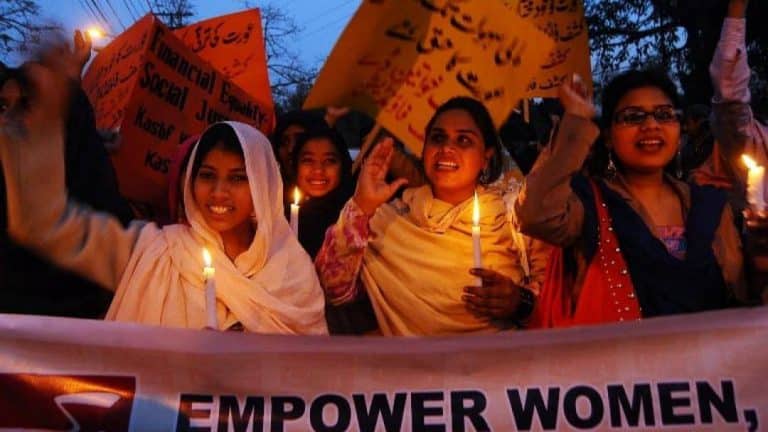
by admin | Oct 25, 2022 | Uncategorized
Sexual harassment doesn’t see status, power, money or fame. It can happen to any person at any time. No woman is ever ‘asking’ for it even if she is not adhering to your definition of morality. Understand consent. Respect her. It just is not okay, ever.
Any activity that is unwelcoming or unwanted especially because it might be of a sexual nature, or have a mere sexual connotation that makes a person feel discomfort of any sort comes under sexual harassment. This activity can make a person feel uncomfortable to an extent where it affects the person’s ability to perform at work or otherwise cause stress. In addition it can cause depression, mental turmoil and even emotional chaos.
Sexual harassment is a common occurrence all across the globe. The fact that it is so widespread does not make it an action that should be spared. While there are laws to protect women against such harassment the public, mostly, is not aware of them. There is a need to create awareness on the legalities surrounding this sensitive yet pressing matter. Women normally are hesitant to report cases of sexual harassment. It is commonly seen that women choose to quietly bear the torment as opposed to gathering the courage to speak up against it. They try to be discreet because they fear the shame that will follow if they draw too much attention to the issue. Hence they choose to, somehow, avoid circumstances leading to sexual harassment. This is seen as standard coping mechanism.
It does take time to deal with the trauma and to seek counsel because instant reaction is guilt and body shame. Victims tend to feel responsible for being violated. When consent is not involved it is never okay. The victim needs to be reassured that it was not something they did that triggered sexual harassment; it was not how she was dressed, or how she may have smiled or how she was walking. The only person responsible for sexual harassment is the violator; the problem lies purely with them. It is the dysfunctional perception of the perpetrator that allows them to sexually objectify another person with complete disregard for appropriacy and morality.
A research conducted in 2008 showed that more than 50% working women face sexual harassment in Pakistan. A total of 24,119 cases were reported pertaining to violence against women in the short period of two years between 2008 and 2010. Among these only 520 filed cases were about sexual harassment faced at workplace by women. A noted case which got some media attention was that of Haleema Rafique, a talented fast bowler, who was driven to suicide due to sexual harassment. Another was that of a flag carrier air hostess who filed a case against the PIA Chairperson for sexually harassing her. This heinous crime has victimised 68% of the girls who shy away from speaking up because of the fear of being condemned by the society even when they are the victims.
Sexual harassment is a plague that has spared no one, Muslim or non-Muslim, one wearing a hijab or clad in western clothes, from developed nations or the under-developed. #MeToo, originally founded by Tarana Burke, was a movement created over a decade ago, but it has taken a long time to become a trending hashtag. It was meant to help sexual assault survivors to gather courage to speak up. Allegations of sexual misconduct against Hollywood producer Harvey Weinstein started surfacing last October, and it is only since then that the #MeToo and #Timesup campaigns have gone global. There has been a surge in accusations against other powerful men since then. However, the movement has just recently caught on in Pakistan, a strongly patriarchal society where we are still fighting for women equality. With Meesha Shafi breaking silence and alleging Ali Zafar of sexual misconduct, other women followed suit. In light of all the backlash and ridicule, whether the accusations are true or not is for the court to decide, but one thing is clear: it takes a lot of courage to step up and admit to being a victim.
Sexual harassment is a crime punishable with imprisonment for three years. Nevertheless, we are a long way from providing a safe haven for women where they can even consider seeking counsel.
The writer is CEO White Ribbon Pakistan and is a development and communications professional with extensive experience in Health Awareness, Behaviour Transformation Communications and Strategic Public Relations. He tweets at @MrOmerAftab.

by admin | Oct 25, 2022 | Uncategorized
Mutilated bodies of children found on garbage heaps, girls forced to return sexual favors at educational institutes and workplaces and women consigned to the hell of forced marriages; all of us come across such incidents in routine now. These are just a few forms of the menace, we call sexual terrorism that is widely engulfing our society and as a result, our women and children are living in deep disarray.
Sexual violence manifests itself in a number of different forms with the most commonly recognized form being rape which consists of a wide variety of acts ranging from child sexual abuse, incest, exhibitionism, voyeurism, obscene phone calls, fondling, sexual harassment, ridiculing a woman to try to limit her sexuality, controlling her reproductive choices, withholding sexual activity in an attempt to punish or hurt her, and treating women as immoral or sinful for expressing sexual needs or desires.
The other soft targets of sexual terrorists are children. According to a report, published by a social sector organization, around 11 cases of child abuse are reported each day in Pakistan. Most of the victims lose their lives during or after the act while the survivors live through awful physical and psychological traumas. The dilemma is that we are gradually becoming dumb or used to such acts. A sudden hype is witnessed at the end of human right groups, media, public and the government when a sexual abuse incident comes to spotlight and then the dust is settled.
Pakistan’s social fabric is based on the teachings of Islam which strictly prohibits any sort of violence, be it physical, sexual or psychological. Moreover, number of laws have been passed during last decade to protect women and children from violence and ensure gender justice in the society. Despite this, we see sexual crimes rising every day.
Sexual terrorism is spreading tentacles not only for the reasons that our legal system is fragile somehow and our society is largely driven by misogynist and patriarchal mindset but there are a number of other contributing factors that we hardly pay attention to.
Lack of education is the root cause whether we admit it or not. Despite some drastic advancements in informational technology and media and different governments’ endeavors to perk up literacy rate during last decade, a huge portion of the society goes on being uneducated and uncultured. When these feral mind are exposed to national and international entertainment media and internet pornography, they are naturally prone to experience sensual behavior which eventually leads to frustration and when this frustration is not channelized, it gives birth to different sexual crimes.
This is turning into a grave mental health issue. This horde of feral and frustrated minds are not only committing sexual crimes, this is hindering the society’s overall well-being and development. So, when we talk about policy making and legal reforms to counter sexual terrorism, we must focus on mental health aspect too.
Another dilemma of our society is communication gap between parents and children and teachers and children. It is one of the prime responsibility of parents and teachers to guide children and adolescents about their sexual health and behavior and train them to deal with odd and unwanted situations confidently. Following the Zainab rape and murder case earlier this year, a campaign of teaching children to differentiate between good touch and bad touch was initiated. This is a good step which must be encouraged and supported.
Also Read:Five Reasons Why Child Abuse Is Rampant In
The perpetrators of sexual crimes prey on the atmosphere of silence and helplessness by the victims. In a society like ours, where the interpretations of religion and culture have been historically male-dominated, it is still considered a serious taboo to openly talk about sexual violence and crimes. Thus, a large number of the victims remain tight-lipped for fear of being further morally oppressed and intimidated upon reporting.
To counter and control this endemic, we need to empower our women and give them voice. We see women in the developed world are breaking silence through the #MeToo movement. Our women must join hands too to ensure a violence free society. Media, clergy, administration and civil society need to launch a joint effort to spread awareness and education about combating sexual terrorism and capacitate women and children, through moral and physical trainings, to actively resist and report sexual crimes so that the perpetrators are punished and victims are given relief on time.
The writer is CEO White Ribbon Pakistan and is a development and communications professional with extensive experience in Health Awareness, Behaviour Transformation Communications and Strategic Public Relations. He tweets at @MrOmerAftab.

by admin | Oct 25, 2022 | Uncategorized
Our society is no easy place for a woman to survive in. Problems surrounding her existence are so deeply rooted in tradition and culture that in this era of technology we are still fighting to ensure provision of basic rights. A woman’s right to exist itself is still under question through socially established cruelty such as honour killing sanctioned by tribal elders themselves. Crimes of sexual nature are as common as harassment at workplaces and marketplaces. To add to this is the burden to fulfill social expectations. After a certain age, a girl is considered too old to get married, delay in pregnancy is assumed to be the fault of the woman, birth of a daughter ends in a guilt-trip for life.
As the society evolves and we hope for education to change the mindsets of people another persuasive tool that we look to for a positive change is the media. Media has established itself as a significant agent of social change. It can influence opinion of the masses, and slowly and steadily this can end in a behavioural change in the audiences. This is why we look to media to not only provide unbiased and objective media coverage but, further, we need it to be more proactive in its affirmative coverage that ascertains respect of and for women. This fight for the dignity and integrity requires a far more responsible role to be played by all forms of media: print, electronic, social.
The dearth of gender-sensitive media policies in Pakistan can be felt in daily reporting and news coverage. The considerable lack of empathy is manifested especially in crime stories that aim for catchy headlines that sensationalise the role of a woman. A murder over the hand of a woman is the woman’s fault, suicide of a ‘jilted’ lover is the woman’s fault, and at times, kidnappings are undersold as nothing more than possible cases of elopement.
The tone such crime stories set is demeaning, with an underline accusation being pointed to the woman. The reporting on television follows a similar trend. The language used in tickers is misleading, and the pet adjectives in a story used for a woman draw a bleak picture for women of the society. Honour killing stories deserve to be dealt with in a sombre manner where a very clear picture is presented. Honour killing is murder, pure and simple. In reporting that message is often missed and one is left wondering who the victim in this story is when the victim is portrayed as the instigator to start with. Any woman killed in the name of honour or any woman dishonoured in the name of rape did not deserve it or ask for it, no matter how the story reads. It is not a reporter’s job to give a judgment call when covering a news story; the narrative should be based on facts and not analysis drenched in stereotypes.
Flip the coin and on the other side you see the same in entertainment. They do it on glossy paper and with a splash of glamour but their portrayal is a far cry from the reality of our society. Splashed across cover pages are women beautiful and talented, no doubt, but they are setting standards not every woman can achieve. Size zero and flawless, is that what a woman is only? In objectifying her, she is being reduced to just a pretty face, when she is so much more. The surge in soap operas has further blurred this portrayal. Women are shown centering their lives on a man; the plot has them waiting for a man, mourning for a man or fighting for a man. The female characters can broadly be characterised as: the conniving ‘bad’ woman who speaks her mind or the subdued ‘good’ woman who does as asked.
Where in the media is the woman we see in our everyday lives; the woman trying so hard to create space for herself, the woman struggling to empower herself, the woman fighting to dream big and achieve bigger?
The writer is CEO White Ribbon Pakistan and is a development and communications professional with extensive experience in Health Awareness, Behaviour Transformation Communications and Strategic Public Relations. He tweets at @MrOmerAftab.

by admin | Oct 25, 2022 | Uncategorized
In Pakistan we assume a woman is meant to stay at home, do chores, marry, bear children, and look after family and house. She is judged based on how well she is doing by these criteria. And the man is the bread-winner. He works, and he earns; his performance evaluation is based on ‘how well he provides for his family’.
How do we decide who does what? Or the assumption suffices that traditional gender roles that have been ascribed over years of practice stand true? This gender stereotyping is reinforced by the repetitive enforcement by content on media as well as content we are exposed to during our academic years. This brings us to curriculum as a factor contributing to the problem.
Curriculum is critical. What is being taught is more important than where it is being taught – in a slum school being run under an overhead bridge or a big school in a posh locality. It is the curriculum that defines what your child is learning and what will he ‘know’ when he is ready to graduate from school. Curriculum theorists argue that one critical question needs to be answered: what should all students know by the time they leave school?
Education is not a mere process of socialisation, but is in charge for transformation as well. Then why is this agent of change failing to transform the traditional gender roles that dominate the society even today?
Curriculum entails textbooks that are chosen to be taught in schools as well. The content including the illustrations on these books leave a lasting image on a child’s mind. On an average, a child is in custody of a textbook of any subject for a long period spanning up to a year. This repetitive exposure to it has an impact on the child, so much so that even concepts of gender roles are further reinforced. What he sees in the society is further validated by the curriculum.
Males are far more noticeable than females in most textbooks. This is mainly because they are frequently the main characters, in story titles as well as in illustrations. Additionally, the visibility of this gender in the text takes a major jump due to the language used, especially the pronouns. A review of the curriculum will reflect how the male gender is used to portray ‘mankind’. ‘Man’ is commonly used to refer to all human beings.
Curriculum needs to encourage gender-neutral language. I struggle with gender-neutral language myself because I was taught to use man as a general reference. However, it is a habit that we need to shake ourselves loose of.
Furthermore, curriculum needs to be progressive where it does not instill in its students the belief that both males and females have mutually exclusive characteristics. Portrayal of a female as weak, passive, and docile character and man as strong and active, just further encourages the traditional narrative.
The depiction of these characteristics is further evident in the text referring to occupational roles. It is rarely ever that the females are shown in occupations and in ranks higher than the males. The man is typically shown as the ‘healing’ doctor in the book and the woman as the ‘caring’ nurse. The same is true for family roles. The domestic tasks of cooking, cleaning, sewing and washing are for the females to do, and the gardening, repairing is for the males. A ‘good’ or a ‘bad’ person is also identified by how they fare against their expected attributes and how well they perform the ascribed tasks. For example, a ‘good’ woman is one who keeps her house clean, is a great cook, and knows how to please the man of the house. And how many women in leadership roles and as heroic characters are taught in our books as compared to men in similar roles?
The construct of the curriculum being taught in our schools is gender-specific, and children exposed to this gender apartheid reinforce the already existing patriarchal society.
The writer is CEO White Ribbon Pakistan and is a development and communications professional with extensive experience in Health Awareness, Behaviour Transformation Communications and Strategic Public Relations. He tweets at @MrOmerAftab.

by admin | Oct 25, 2022 | Uncategorized
The conspiracy theorists in Pakistan have a treasure chest full of interesting notions, most of which take every political twist and every social revolution and tie its knot to the ‘western agenda’. The subject of women rights is no different. The subject is likely to be considered a threat to Islamic values and a propagation of a western agenda, and you will be pinned as an agent of the west.
Why is it so? Why is talking about women rights considered a western agenda? Does the east not believe in giving women their due place? Is the ‘mashraqi tehzeeb’ only kind to the men? Sadly, in our society that does hold true. Contradictions are easy to spot from the very early beginning; birth of a girl child is proof of that. The consolations follow soon after, while birth of a boy is met with joy everywhere. To the extent that how the family reacts to the mother also is affected drastically. It is common practice that mothers giving birth to daughters are shunned by their own family, and in some cases even sent packing back to their parent’s house.
The discrimination continues into the formative years where how the boy and girl are raised is not the same; the opportunities and responsibilities both are given are not the same. It is instinctive for most families to compromise on the girl’s nutritional needs in favour of the boy sibling. The same holds true for education.
Encouraging families to educate their girls for their own economic empowerment and the society’s serves the west, how?
It is a norm to marry off girls at a young age, in some areas, they are considered ready for marriage even at the ages of 9 or 10. Marriage in itself is a subject that completely overlooks the right of a woman to decide or choose for herself. Is willful consent of a girl being wed not an integral part of the nikah? The viles prevalent in our society in the name of marriage question not only the integrity of the girl but also her entity as a human. Dowry is one such evil. What gifts the girl comes bearing for the family and the husband and herself, in many cases, determines her standing amongst the in-laws. There are many girls, especially in the lower economic strata of the society, who have had their hand refused in marriage because their families could not promise much in dowry.
Talking about this wide-spread evil is against our values, how?
The crimes against women are a courtesy extended by their own blood relatives as well as by the society at large. Cases of domestic violence were not even considered worthy of a discussion a few years back, even now it is a problem that is dismissed with a shrug by the family of both the victim and offender.
How does it propagate the western agenda if we raise our voices to say: “Please don’t hit women! Please don’t throw acid on them! Please don’t abuse them.” How is it disrespect to our values if we speak out against the sexual harassment and abuse women are subjected to at workplaces and in marketplaces, and even in the sanctity of their own homes?
Are we trying to drown these outcries for justice with blame slogans of ‘western agenda’? Hiding our own shortcomings and weaknesses, or maybe we have nothing better to do like the boy who cried wolf?
Inheritance laws taught by Islam are clear on division of assets, wherein women of the family in the role of a mother, daughter, and wife are allowed their share. Then why is there the practice of marrying women to the Holy Book so the land they are to inherit stays within the family? The Holy Book she is being married to does not endorse this tradition.
The longstanding tradition of suppressing women is allowed to continue in the name of honour, religion, culture, tradition and norm. Everyone is happy to stand by and watch.
But talking about it is a ‘western agenda’.
The writer is CEO White Ribbon Pakistan and is a development and communications professional with extensive experience in Health Awareness, Behaviour Transformation Communications and Strategic Public Relations. He tweets at @MrOmerAftab.





